
6 Writers: Inio Asano
July 17th, 2010 by david brothers | Tags: 4321, inio asano, solanin, what a wonderful world!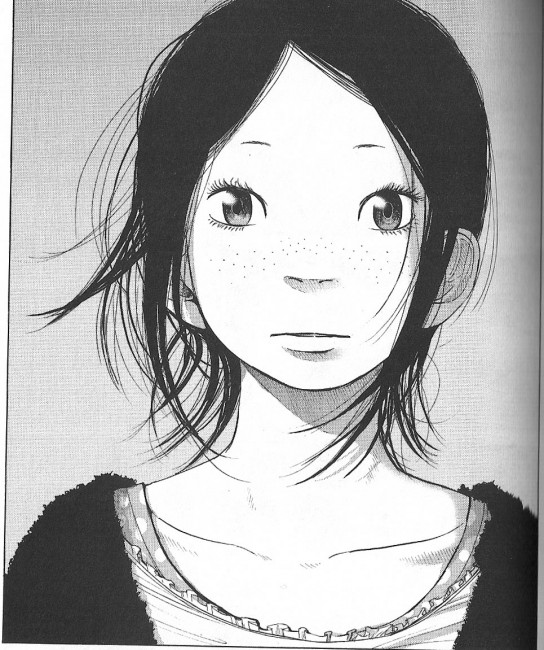
When I was in high school, I was really into David Fincher’s Fight Club. The message of the movie, this twisted idea that we had been screwed over by mumble mumble that we should all just kinda go crazy because why not, man! Yeah! In hindsight, I was also a Rage Against the Machine fan, in high school, and slowly figuring out politics, so you’ll have to pardon my naivete. Fight Club actually served as an inoculation of sorts against further insanity of that type, so when I hit that point in your 20s where nothing makes sense, I was a little less likely to have a completely stupid reaction to my new found melancholy than I would have if I hadn’t seen Fight Club one hundred times and completely rejected what it put forth.
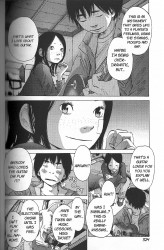
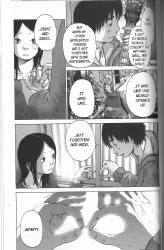
The one writer who has best managed to capture the feeling of oppressive melancholy punctuated by bright spots of enjoying life despite your depression of my early twenties is Inio Asano, creator of solanin, What a Wonderful World!
, and several other works. His artwork is an interesting mix of realistic (almost to a fault) backgrounds and characters who strike me as a cartoonier version of Naoki Urasawa’s already fairly cartoony work. He draws people with very soft features, broad faces, thick noses, and wide mouths. He draws mouths kind of like Chris Bachalo does. He also draws some of the cutest girls I’ve ever seen in a comic.
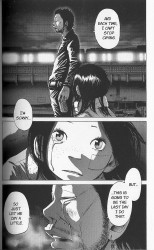
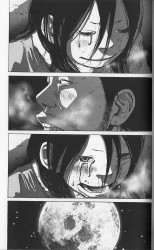
solanin is about as true a portrayal of twenty-something ennui as I’ve ever seen. Your twenties are the first time you’re really out on your own in the world, away from the safety net of your parents and everyone being kind to you just because. You soon learn that your parents told you a whole lot of well-meaning lies when you were a kid. It isn’t as easy as “Go to college and then get a job” because college doesn’t guarantee a job. It doesn’t even guarantee you’ll be prepared for a job. The world isn’t kind by default. Someone has to do the crappy jobs, and it’s probably you, because the cool jobs aren’t as cool as you think they are and the ones that actually are cool are for people who are doing better than you are. All the things that defined you in high school fall away, because all of the grown-ups you suddenly have to interact with don’t care how well you ran track or how many spelling bees you won. They just want to know if you can get this done fifteen minutes ago. And hey, student loans!
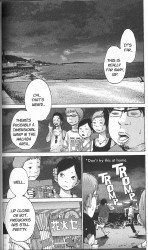
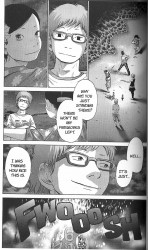
Your twenties are when you learn that you’re not half as special as they claimed you were. In fact, you’re not special at all. You’re normal. You may have some skills other people lack, but you’ll still have to work your butt off for that to matter. Your twenties are when you finally wake up. And yes, it isn’t the end of the world, but when you’re in the middle of that? It’s like drowning. solanin opens just as that ennui is hitting Meiko Inoue hard. Nothing is working out like it was supposed to, her boyfriend is in stuck in a state of being almost successful, and she’s just… tired. She’s listless.
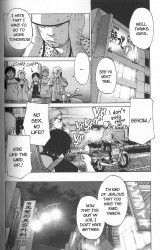
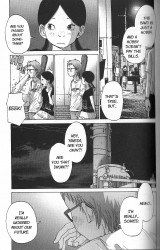
This doesn’t stop her from enjoying life when there’s something to enjoy. She loves watching her boyfriend perform, she has fun when they set off fireworks on the beach, and she enjoys the company of her friends. But, there’s always this miasma where rent and a career and her future are sitting and lurking, waiting to pounce. All of the pressures of adult life, all of the stuff you simply can’t prepare for, weigh heavy on her shoulders.
When I think of coming-of-age comics, my first thought is of books that struck me as dwelling on the pain of life. I’ve always thought of them as being about sad sack people who are obsessed with being sad. I could never relate to those. It just never clicked. It makes me uncomfortable, to be honest.
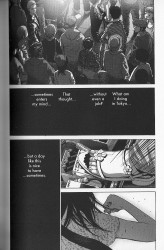
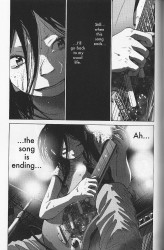
Hideaki Anno’s Neon Genesis Evangelion is the first anime that comes to mind when talking about misery and depression. It’s practically misery exploitation at times, stacking trauma and vile acts one on top of the other until characters collapse in an orgy of hate and self-loathing. It’s ugly and off-putting and entirely too cynical to be entertaining these days. The message of Evangelion is “life sucks and then you die.”
Asano’s work preaches the opposite. I think that’s why I enjoyed solanin and What A Wonderful World! so much. They refuse to wallow in misery. solanin is about growing up and understanding the fact that life sucks, but also recognizing that the bad parts aren’t the full picture. There is a lot to life, and while there is a lot to dislike, there’s also a lot to enjoy. The point isn’t the sad parts. The point is how the sad parts are broken up by parts where people prove that it’s always worth having good friends. There are those moments where you just stop and look up and everything is wonderful. It doesn’t make the sad moments less sad, but they do make a difference when you need them to.
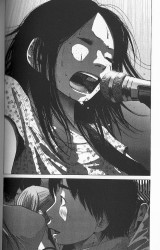
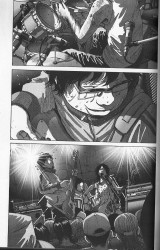
What A Wonderful World! is kind of a test drive for solanin. Designs and ideas appear in WAWW! and then later appear in refined form in solanin. The result is that solanin is a carefully crafted work of stunning optimism and honesty. Life is going to suck. There’s no getting around that. Once you hit that point where you’re an adult, rather than a child, you’re in for a hard time. The trick is weathering those hard times and appreciating the good times. That’s the message of solanin.
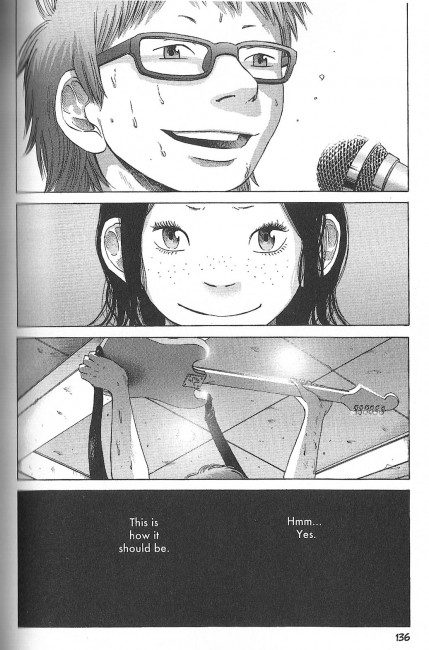

unrelated to this post but considering you saw Fight club, what’d you think of battle royale?
and WAWW is pretty great for someone growing up right now like me
“When I think of coming-of-age comics, my first thought is of books that struck me as dwelling on the pain of life. I’ve always thought of them as being about sad sack people who are obsessed with being sad. I could never relate to those. It just never clicked. It makes me uncomfortable, to be honest.”
Exactly why I tend to shy away from those types of stories and why I stayed away from solanin for as long as I did. Reading those types of stories doesn’t make me think about the characters or themes or anything, but makes me think if the author is or was the same way. Are they Droopy Dog personified or do they just remember that from their transition into adulthood?
Also, I find it interesting that Gainax’s three most popular series are all about growing up, but FLCL and Tengen Toppa Gurren Lagann are definitely much more optimistic than Evangelion.
[…] articles about six of his favorite comic writers. Among his choices: Naoki Urasawa, Eiichiro Oda, Inio Asano, and Stan Sakai. Each essay explores key themes in the artist’s work, from the corrosive […]
“It was like zero and zero got together and made infinity.”
The last panel of that page is more beautiful than I know how to put into words.
“solanin is about growing up and understanding the fact that life sucks, but also recognizing that the bad parts aren’t the full picture. There is a lot to life, and while there is a lot to dislike, there’s also a lot to enjoy.”
Fuck, so true, while i grow up i realize that im in deep shit but i can still enjoy the good parts….fuck it, i can!
Great post.
QJoe
Dex-Star’s origin is more optimistic than Evangelion. When the best thing that you can say about something is, “Well, at least it’s happier than Evengelion”, you might as well assume that noone’s going to buy it.
David, have you read Goodnight PunPun? It’s not licensed in America yet, but it is amazing.
@Rich Maytidu: Nah, but I saw a preview online that got me all hot and bothered. I’m praying his whole bibliography gets licensed.
“The message of the movie, this twisted idea that we had been screwed over by mumble mumble that we should all just kinda go crazy because why not, man! Yeah!”
I’m way into that description.